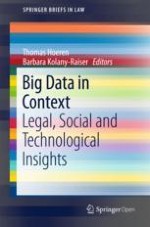This book is open access under a CC BY 4.0 license.This book sheds new light on a selection of big data scenarios from an interdisciplinary perspective. It features legal, sociological and economic approaches to fundamental big data topics such as privacy, data quality and the ECJ’s Safe Harbor decision on the one hand, and practical applications such as smart cars, wearables and web tracking on the other. Addressing the interests of researchers and practitioners alike, it provides a comprehensive overview of and introduction to the emerging challenges regarding big data.All contributions are based on papers submitted in connection with ABIDA (Assessing Big Data), an interdisciplinary research project exploring the societal aspects of big data and funded by the German Federal Ministry of Education and Research.This volume was produced as a part of the ABIDA project (Assessing Big Data, 01IS15016A-F). ABIDA is a four-year collaborative project funded by the Federal Ministry of Education and Research. However the views and opinions expressed in this book reflect only the authors’ point of view and not necessarily those of all members of the ABIDA project or the Federal Ministry of Education and Research.
